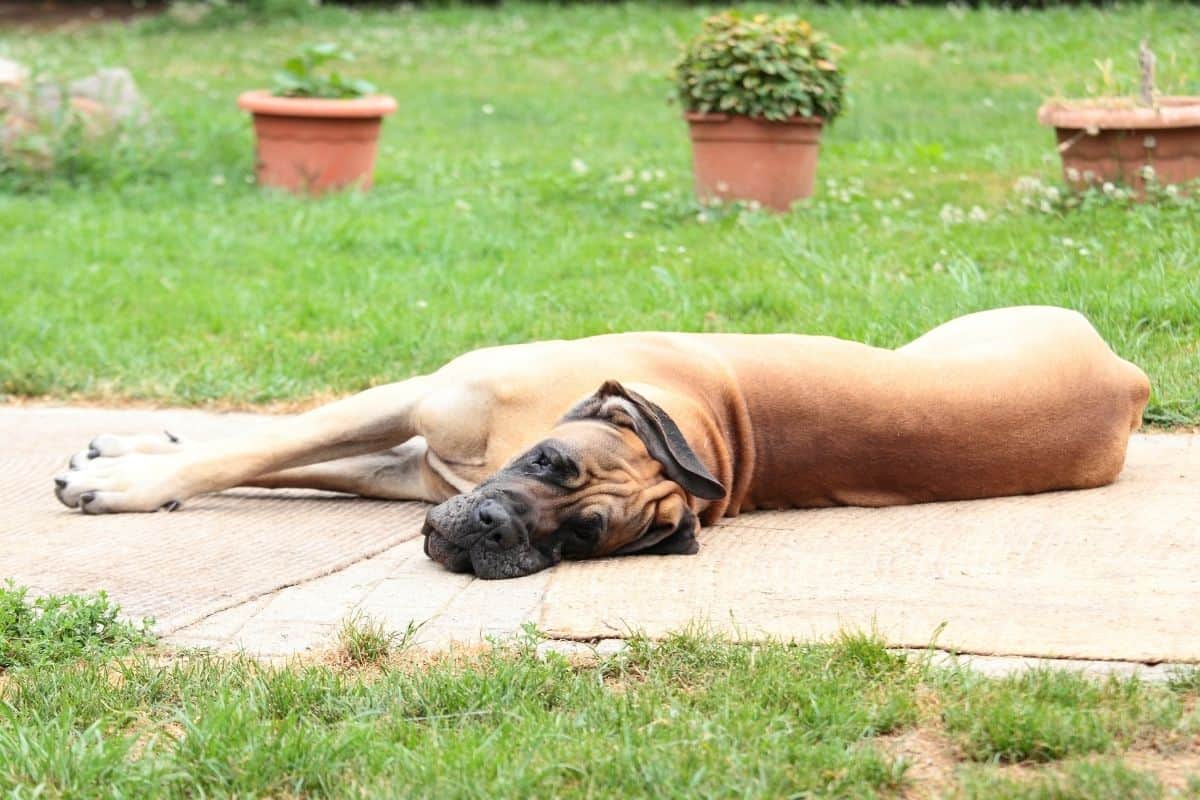
Have you ever heard your Great Dane’s stomach making a lot of noise or gurgling sounds and wondered if it’s something that you should be worried about?
There are many causes for your Great Dane’s stomach to be making loud noises. While many are nothing to worry about, some can be a cause for concern.
Why is my Great Dane’s Stomach Making Noises?
By knowing what to look for and when you need to see your vet, you can quickly assess if this is an issue that you will need to be treated right away!
The medical term for these sounds is borborygmi.
You should commonly hear sounds from your dog’s stomach every 2 to 3 minutes. These sounds occur when the fluids in your dog’s intestines are moving back and forth. If your dog is having more sounds than every few minutes, then they may have a medical issue.
Just like with too much sound, no sound at all can also be a concern!
If your Great Dane had an obstruction and nothing was moving at all through their intestines, you would not hear any sounds when you place your ear near your dog’s stomach.
Common Reasons for Great Dane Stomach Noise
These are five reasons that your Great Danes stomach may be making more noises, as well as other signs that you need to look out for when you start to notice these issues.
- Excessive gas build up. If your dog has been breathing heavily or panting a lot, they may have an excessive gas build up in their intestines. You can many times hear this gas as it moves through your Great Dane’s intestines. The gas builds up can also lead to bloat. If your dog’s abdomen seems bloated or you notice any other signs of bloat, it would be best for your dog to see your vet right away.
- Your Great Dane has diarrhea. If your Great Dane has diarrhea, their intestinal tract is moving quicker, causing noises more frequently. You will quickly know if your dog has diarrhea. If they are, it may be best to see your vet see what is causing this and get started on medication to help them feel much better. Your dog could have diarrhea from a change in diet, eating human food, or potentially parasites.
- Your Great Dane is hungry: Just like with people, your Great Dane may have skipped their last meal, and they may be hungry! Their stomach’s will also growl when they need food. If your Great Dane has these sounds because they are not eating, it may be best to see why they are not eating. They may have GI issues or dental issues, causing them to not want to eat as much.
- Your Great Dane at something that they should not have: If your Great Dane is known for finding and eating things that they should not have ate, they may have a condition known as Gastroenteritis. This can cause them to have an increase in stomach sounds. Your Great Dane may have also chewed up and swallowed a sock or toy. This could also irritate your dog’s intestines and cause them to have increased stomach sounds.
- Your Great Dane has Bloat: If your dog has bloat, they may have an increase in stomach sounds. You will notice that your dog may have a bloated abdomen, lethargy, or vomiting. If you notice any of these signs in your Great Dane, it is best to see your vet right away. Bloat can be a life-threatening issue that requires emergency surgery and treatment.
If you think that any of these are reasons that your dog could have increase stomach sounds, it may be best for your Great Dane to see your vet.
There are also a few other at-home treatments that you can try at home (see below) to help your Great Dane feel much better.
What To Do When A Dog’s Stomach Is Gurgling
If your dog has a mild upset stomach, there are many things that you can do at home, such as:
- Bland diet: Feeding your dog a bland diet of boiled chicken and rice will help settle their stomach. Usually, their stomach noises and GI issues will improve over 24 to 48 hours. If it gets worse or your Great Dane starts to vomit, it would be best to see your vet.
- Probiotics: Adding probiotics to your dog’s diet will help replace the good bacteria in your Great Dane’s stomach. Many probiotics can be purchased at your local pet store or online. Some of the best probiotics for your Great Dane can be found here.
- Gas X: Gas-X will help decrease the gas build up in your Great Dane’s stomach. Some vets will even recommend that your Great Dane take this medication daily to help prevent Bloat. You can give your Great Dane 1 tablet a day to help decrease the gas build up and hopefully decrease the loud stomach sounds.
- See your vet: If your dog acts like they are painful or seem bloated, it may be best for your dog to see your vet. They can assess your dog and help you figure out what is causing these issues. They can also provide your Great Dane with any medication that they need to help resolve these loud stomach noises.
When Should You Be Concerned About Stomach Noises?
With that being said, in many cases stomach noises are perfectly normal!
However, if these stomach noises are accompanied by other symptoms like the ones described below, then there may be cause for concern.
If you notice that your dog is having issues such as:
- Vomiting
- Diarrhea
- Not eating
- Lethargy
- Bloated abdomen
- Drooling
- Regurgitation
These are all signs that would indicate that you should see your vet right away. They may want to run bloodwork, check a urine sample, take x rays or abdominal ultrasound to see what is going on.
Things that your veterinarian in look for would be:
- Gastroenteritis
- Inflammatory bowel disease
- GI obstruction
- Pancreatitis
- Liver disease
These can all cause your Great Dane to have increase stomach noises as well as other GI signs. Your vet can quickly assess your Great Dane and run the necessary test to see what is causing your Great Dane to have the signs that you are seeing.
Final Thoughts on Stomach Noises
If your Great Dane’s stomach is making noises, this may be perfectly normal. Listen to see if these sounds seem more frequent or if they are occurring every 2 to 3 minutes.
If you notice them occurring more often than that, it may be best for your vet to check your Great Dane out.
If your Great Dane is showing any other signs along with the stomach noises, these would be a cause for concern, and you should see your vet right away. With quick assessment and treatment, your vet can get your Great Dane back to their normal healthy, and happy life!

Hi, and thank you for the great dane resources!!! I was wondering if you have ever heard of people using salmon instead of chicken so that they can get the omega 3 fats instead of just the omega 6???